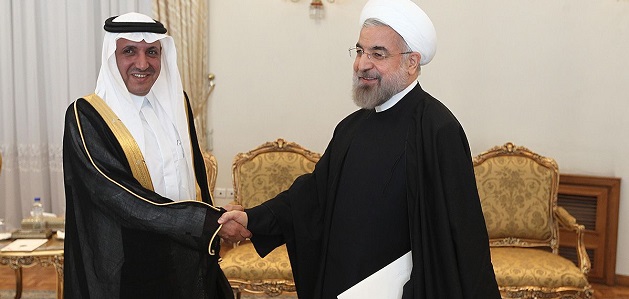Changing Regional Dynamics May Result in Renewed Saudi-Iranian Diplomacy

A Saudi invitation to the Iranian Foreign Minister may facilitate a shift in relations, but it is more likely that it has been offered as a means to address regional realities, rather than to resolve longstanding differences.
Background
In his response to a media question, Prince Saud al-Faisal, the Saudi Foreign Minister, claims to have extended an invitation to his Iranian counterpart, Mohammad Javad Zarif. Iran, however, claims it has not yet received an official invitation, leading to speculation on whether or not this is official Saudi policy. Iran, for its part, remains hopeful that a meeting between the two regional powers can be brokered.
Comment
The announcement of the invitation came while US Defence Secretary, Chuck Hagel, was visiting Riyadh. The US denies any involvement in arranging the invitation. Washington is currently engaged in discussions with Iran to normalise relations and defuse the longstanding tensions surrounding its nuclear programme. These negotiations may lead to a deal that will see limits placed upon the nuclear programme in exchange for a lifting of international sanctions.
Saudi Arabia is becoming resigned to the fact that a rapprochement between the US and Iran is increasingly likely. There is also a fear within the kingdom that the US is beginning to disengage from the region. While this fear is exaggerated, there are some grounds to substantiate it. President Obama has been less willing to become militarily involved in regional conflicts, such as Libya and Syria, than previous US leaders. Several Republican senators are also increasingly advocating a return to American isolationism. For Riyadh, a reduced US commitment to the region, and the prospect of Iran re-engaging with the world, is extremely worrying.
In addition to renewed levels of engagement with the West, Iran is also reaching out to its Gulf neighbours in an attempt to strengthen diplomatic relations. Foreign Minister Zarif has already visited Oman and the United Arab Emirates. Consequently, Riyadh is probably reaching out to Iran diplomatically to avoid becoming increasingly isolated in the region.The Saudi invitation also appears to have been made more out of necessity than newfound goodwill towards its eastern neighbour. Tehran and Riyadh have a common interest in countering al-Qaida in the region, which may, at least in part, explain the invitation.The Sunni militants affiliated with al-Qaida in Syria, Lebanon and Iraq, help to counter Iranian influence in the region, but this may yet come at a cost to the Saudis. If al-Qaida is successful in setting up a regional base it could eventually challenge Saudi dominance in the Sunni sphere. At this stage, the Saudi-Iranian relationship is unlikely to progress much beyond countering al-Qaida in the region.
Historical tensions between the two states are deeply engrained. Since the 1979 Iranian revolution, the kingdom has been wary of what it perceives to be expanding Iranian influence in the region. Above all else, the leaders of Saudi Arabia are particularly keen to protect their form of monarchism. Iran is seen as the main threat to the kingdom’s political system. Consequently, it is understandable that the House of Saud is deeply wary of Iranian intentions.
A Saudi-Iranian rapprochement will not be forthcoming in the near future; the differences between the two states are too great a barrier to the establishment of amicable relations. A renewed diplomatic relationship between them is unlikely to alleviate decades of mistrust and apprehension. It is only by building mutual trust and goodwill that the Saudi-Iranian relationship can be improved and this takes time. Even though the willingness of both parties to engage in discussions suggests a positive change in relations could be forthcoming, it is still far too early to suggest that a thaw in relations is underway, especially since a date for discussions has yet to be finalised. The outcome of the Iranian visit, should it actually occur, will provide a much stronger indication on whether more amicable relations can be forged.
Mervyn Piesse is a Research Assistant at the Indian Ocean Research Programme at Future Directions International.
This article was originally published by Future Directions International. It is republished with permission.


